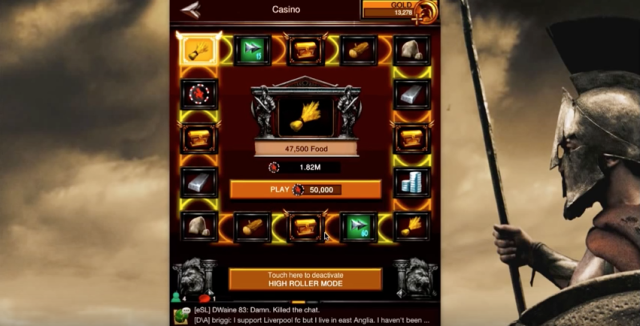
Losing your hard-earned cash playing Game of War's virtual spinning wheel isn't a real-world problem. That's what a federal judge is ruling in dismissing a proposed class-action suit against the game's maker, Machine Zone of Palo Alto, California.
The popular Android and iOS game is free to play, but players may purchase virtual "gold" to "improve their virtual towns and hasten their advancement in the game." Real money is required to buy the digital gold, from $4.99 for 1,200 pieces to $99.99 for 20,000 pieces. With that gold, players can buy virtual "chips" to wager on a virtual casino-like spinning wheel. Gamblers win virtual prizes with every spin, from "wood" and "stone" to more chips and even "gold." The suit charges that algorithms make it likely that gamblers will win "basic items" instead of more valuable ones like gold.
"On the surface, Plaintiff charges that Defendant trampled real and important rights and interests of hers, wrongfully and unlawfully, in an alternative, virtual world created by an electronic game," US District Judge James Bredar ruled. "But a careful probe beneath the surface reveals a hodgepodge of hollow claims lacking allegations of real-world harms or injuries. Perceived unfairness in the operation and outcome of a game, where there are no real-world losses, harms, or injuries, does not and cannot give rise to the award of a private monetary remedy by a real-world court."
The suit (PDF) by a Maryland woman named Mia Mason says she lost more than $100 and claims the casino is an unlawful "slot machine or device." The court ruled that were it to apply Mason's logic, one might declare skills-based game pinball to be an illegal gambling device as well.
The judge said that, even if he were to decide in the woman's favor, determining the amount of damages she is owed would render him in the "unenviable position of pricing the conversion from virtual gold and chips to virtual wood and rock."
"Such whimsical undertaking may spark the imaginations of children and ardent game enthusiasts, but it can have no place in federal court," Judge Bredar ruled.
The judge noted that it was immaterial that there are secondary markets, like on e-Bay, where people buy and sell Game of War accounts and other goods. The further along a player has gotten in the game, the more valuable an account is in a secondary market.
"Plaintiff does not allege that Defendant hosts or sanctions these secondary markets, nor does she allege that she has ever sold or attempted to sell an account—nor even that she intends to do so in the future," the judge ruled.
| < Prev | Next > |
|---|
